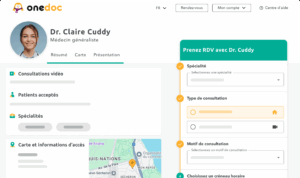
Choosing the legal form of a medical or dental practice in Switzerland is a crucial step when setting up or taking over a practice. Several options exist—from the sole proprietorship to the joint-stock company (AG). From liability, taxation, permits (RCC / C) to day-to-day organisation, here is an overview of the possibilities.
Which legal forms exist for medical and dental practices in Switzerland?
Doctors and dentists most often rely on the following structures:
| Legal form | Typical profile | Liability | Minimum capital | Billing / permits |
|---|---|---|---|---|
| Sole proprietorship | Single practitioner, small practice | Personal and unlimited | None |
Billing via personal RCC number |
| Simple partnership | 2 or more practitioners without a legal entity | Personal and joint and several among partners | None | Shared infrastructure, individual RCC numbers |
| GmbH (limited liability company) | Medium-sized practice, multidisciplinary team | Limited to share capital | CHF 20’000 min. | Company RCC or C numbers for employees |
| AG (joint-stock company) | Large practice / medical centre | Limited to share capital | CHF 100’000 (at least CHF 50’000 paid in) | Company RCC or C numbers for employees |

The initial capital for an AG or GmbH can consist of contributions in kind. You can therefore use certain equipment to reach the required amount. To do so, the contribution must be available, transferable, and precisely valued by a licensed audit expert (independent specialist).
Which legal form is most common for medical practices?
For a solo practice, the sole proprietorship remains the most common choice: simple to set up, low formation costs, direct billing with a personal RCC number. As teams grow and economic responsibilities increase, many doctors switch to a GmbH or a AG to limit risks and structure the organisation.
AG or GmbH: When is it the right choice?
Prefer a GmbH or AG when:
- several doctors practise together
- employees are hired
- significant investments (imaging, chairs, premises, IT) are planned
- you want to clearly separate private assets from professional activity and limit risks
Advantages:
- Limited liability to the company’s capital
- Clear separation of private and business assets
- Possibility to employ doctors billing under a C number
- Transfer of shares and entry of new partners/shareholders made easier
Disadvantages:
- More complex incorporation process, increased accounting obligations
- Double taxation (company + private income) for the AG
Simple partnership: What should group practices know?
Without a legal entity, a simple partnership is automatically created when several practitioners manage a practice together.
It is flexible but risky: partners are jointly and severally liable for debts.
Each doctor keeps their RCC and bills individually to insurers.
As the activity becomes more structured (team, growth, equipment), it is often wise to switch to a GmbH or AG to secure liability and clarify governance.
RCC and C numbers: What differs by legal form?
Sole proprietorship
- The RCC (Creditor Code Register) number is tied to the practitioner as a natural person, who therefore bills in their own name.
- Billing is done directly via the professional’s personal RCC number, and the practitioner must also hold the authorisation to practise.
Simple partnership
- In principle, each partner keeps their own RCC number because there is no separate legal personality: each member acts in their own name with their own licence to practise.
- Billing can therefore continue with the partners’ individual RCC numbers; no shared RCC is issued.
GmbH / AG
- The RCC can be issued in the name of the GmbH or AG if the company obtains an operating licence as a legal entity; the company then has its own RCC number for billing.
- If doctors are employees of the company, they may bill with their own C number as employees, subject to holding the appropriate authorisation.

In short: Which legal form fits your practice?
| Criterion | Sole proprietorship | GmbH | AG |
|---|---|---|---|
| Liability | Unlimited | Limited | Limited |
| Formation complexity | Low | Medium | High |
| Minimum capital | None | CHF 20’000 | CHF 100’000 |
| Taxation | Income of the owner | Company + owner’s income | Double taxation (company + shareholders) |
| Team size | Solo | Small to medium | Large structure / investors |
| RCC / C | Personal RCC | Company RCC or C number | Company RCC or C number |
The right legal form for your medical or dental practice
- You work alone and want simplicity? The sole proprietorship is often the best fit.
- You work in a team or are hiring? The GmbH offers a good balance between protection and flexibility.
- Your centre is growing? Planning a funding round? The AG is likely the right solution.
Whatever you choose, seek legal and tax advice to confirm the most advantageous long-term structure (liability, remuneration, taxes, share transfers, permits).
 Are you starting or taking over your own practice? Discover our tips!
Are you starting or taking over your own practice? Discover our tips!





